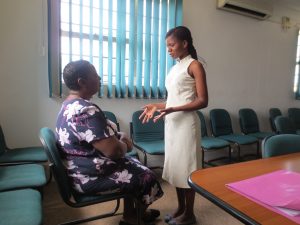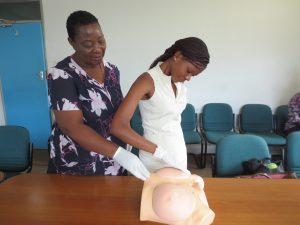

As a 16-year breast cancer survivor, Maggie Zgambo was troubled by the barriers she saw preventing her fellow countrywomen in Malawi from being screened for breast cancer.
Some did not have permission from their husbands to be tested. Others went to the doctor with a breast health issue, such as a lump, but were not examined and given pain killers or antibiotics instead. Then there were the women who had abnormal clinical exam results, but who refused follow-up examinations because they were afraid of having cancer.
“It was so frustrating trying to phone them and plead with them to come,” Zgambo said. “But they would not come.”
Zgambo witnessed these challenges firsthand through her participation in a UNC Project-Malawi pilot study that trained lay women to conduct breast examinations. In all, study staff screened 1,000 women. By the researchers’ count, the project was a success: lay women without formal medical training could be taught to provide high-quality breast exams, and Malawian women were eager to receive screening when it was offered.
UNC researchers had to carefully design the study to overcome obstacles related to the country’s health care resources and infrastructure to make the project work. Despite the difficulties, they underscore the immense importance of screening for breast cancer as incidence of the disease increases in the country and in Africa overall.
“There are huge demographic transitions that are occurring in Africa, where populations are aging and lifestyles are becoming more westernized, all of which are associated with increased breast cancer risk,” said Satish Gopal, MD, MPH, a UNC Lineberger member and the cancer program director for UNC Project-Malawi.
“Breast cancer is often occurring in very young women who would be cured in the U.S., but die because they’re in Malawi. That’s a disparity we’re trying to find solutions to.”
Spared for a purpose
Zgambo knows the fear cancer can instill. Sixteen years ago, she discovered a lump in her breast that she thought was a simple infection. Her friends told her not to worry when it didn’t clear up on its own. They, too, thought it was likely an infection that could be easily treated with antibiotics. When her doctor told her he was 99 percent certain she had breast cancer, she was angry at herself for not recognizing the signs.
“I felt ignorant, and was furious at myself that despite my education, I did not think about breast cancer,” she said.
She also felt like the world was ending. That’s because for many people in her country, the odds of surviving cancer of any type are low.
There is currently no radiation treatment in Malawi. Cancer drugs that have dramatically improved survival for women with specific breast cancer types in the United States are often not available. There is no national breast cancer screening program, awareness of breast cancer is low, and women are often diagnosed at late stages.
“In Malawi, no one wants to talk about cancer because when someone has cancer, whatever type, it is like they are saying you are going to die,” Zgambo said.
“Why? Because this is what was previously happening. If you had cancer, it meant you had to seek medical attention outside of the country. This involved a lot of money. There was no treatment for breast cancer apart from surgery until recently.”
But breast cancer was not a death sentence for Zgambo. While her surgery was unsuccessful, she was able to travel to South Africa to receive chemotherapy treatment, and she survived.
Zgambo believes God saved her for a reason: to spread awareness about breast cancer and the importance of early detection. She was passionate about joining the breast cancer screening project through UNC Project-Malawi, a clinical care and research collaboration between the University of North Carolina at Chapel Hill and the Malawi Ministry of Health, to do just that.
“When I was approached about the breast cancer screening project, I was very happy to be part of it,” Zgambo said. “I knew I would be able to reach out and teach a lot of women about breast cancer, and help others seek early medical attention.”
Using innovation and compassion
In designing the breast cancer screening project, UNC Project-Malawi researchers overcame health care resource limitations. Having experience working in a cancer clinic in the country’s capital of Lilongwe, Gopal and his colleagues knew how to optimize care despite resource constraints.
They work innovatively to provide care in a clinic where the beds, chairs and benches are often always full and people line up before the clinic opens, said Racquel Kohler, PhD, a former student at the UNC Gillings School of Global Public Health. Kohler, who is now a research fellow at the Harvard T.H. Chan School of Public Health, helped lead early research at UNC that laid the groundwork for the breast cancer screening pilot project.
“Some of the challenges to accessing breast cancer services in Malawi are similar to what low income women in the United States face,” Kohler said. “Structural barriers like distance to care and transportation costs as well as cultural norms prevent women from seeking care. Poverty and gender inequalities compound the problem in Malawi.”
One obstacle the researchers had to work around in designing the screening pilot was Malawi’s limited access to mammography and extreme scarcity of trained health care workers. They thought a physical breast exam by women who did not have formal medical training would be a good solution to that problem, analogous to task shifting approaches that have been successfully applied for HIV treatment in Malawi, said Gopal, who is also a member in the UNC Lineberger Global Oncology Program. They also arranged for the lay women they planned to train as breast health workers to conduct exams in clinics where women were already seeking care for other medical issues, thereby reducing barriers linked to transportation and low awareness of breast cancer.
“Often in medical clinics in Malawi, it’s first-come, first-serve, and the waiting rooms are packed to the gills,” Gopal said. “Women more or less wait for an entire day to get even relatively simple services. So we thought we’d try to take advantage of that time by giving standardized, educational talks about breast cancer and then offer screening immediately after.”
Implementing breast cancer screening in Malawi
UNC Project-Malawi researchers selected Zgambo and three other women to work as breast health workers. The women were taught about breast cancer prevention, detection, care and data collection in a four-week training course led by UNC surgeons, researchers, and Malawi Ministry of Health collaborators. They were trained to detect breast cancer tumors using a simulator with 27 different tumors and lymph nodes of varying shapes and sizes, as well as benign masses. These efforts were led by Lily Gutnik, MD, MPH, a surgery resident at University of Utah University Hospital who lived in Malawi for a year through a post-doctoral research fellowship sponsored by the UNC Global Health Fellows Program and the Fulbright and Fogarty programs.
The training increased the women’s knowledge about breast cancer dramatically — from 49 percent to 91 percent of cancer-related questions answered correctly in surveys, according to an article on the study published in the journal PLOS One.
After their training, the women led 30-minute educational talks and conducted breast examinations. According to an article published about the project in the Journal of Surgical Research, of the 1,220 women eligible women, 82 percent agreed to receive a physical breast cancer exam. Researchers count that as a key hallmark of success for the pilot.
“In the absence of any screening efforts in Malawi, our study was focused on whether this would be accepted and whether it was feasible – and we demonstrated both of those things resoundingly,” Gopal said. “Uptake was really high. Most women who were offered this service, were really interested.”
Of the women who declined, the most common reason was that women were too tired or sick to participate. But women declined other for reasons, too, including needing their husbands’ approval, fear of cancer diagnosis, and lack of interest.
Researchers also had issues providing follow-up testing for women who had abnormal exam findings.
The breast health workers identified 67 women — out of 1,000 screened — with abnormal results. Physicians confirmed 29 of those cases, and recommended 19 of them for a biopsy. Thirteen women who had potential cancerous tumors in their breasts agreed to receive a biopsy, and two were abnormal. Neither of two women with abnormal test results had the masses removed surgically.
One woman declined to return, and the other could not be contacted by phone. Four women of the 19 were recommended for biopsy because of enlarged axillary lymph nodes rather than because of suspicious breast lesions, and of those women, one was diagnosed with a type of HIV-linked cancer called Kaposi sarcoma.
“We tried to be comprehensive and thoughtful about how we put the program together, especially regarding downstream follow-up for women with detected abnormalities, and that was responsible for some of its successes,” Gopal said. “But even then, we had difficulty with some women, where despite calling them weekly and offering to reimburse them for transport or pick them up, we still had women who were difficult to get back in.”
Now that the pilot project is finished, Gopal said he hopes to eventually see breast cancer screening implemented on a larger scale, but that’s contingent on funding and interest. One of the important immediate next steps is to create a surveillance system so they can track breast cancer cases and outcomes in Malawi, said Stephanie Wheeler, PhD, a UNC Lineberger member and associate professor in the UNC Gillings School of Global Public Health. She also said that before screening can become routine, referral and treatment patterns need to be standardized.
“Otherwise, cancer screening in and of itself loses its value,” Wheeler said.
For Zgambo, her hope is that one day, early breast cancer detection will reduce the number of deaths. Although the pilot screening program is over, she said she’s continuing to spread awareness in a smaller way. She’s a member of a group of cancer survivors that has a mission to reach out to as many women as possible. Twice a year, they hold an event where they talk about their experiences, challenges they faced and the importance of early detection.
“I always educate women when the opportunity arises, say at church events or when I receive women visitors at home,” she said.
Just having her involved in the project, however, was extremely important, Gopal said.
“She provided a strong, living image that cancer can be overcome, and that women can go on to live healthy, productive lives even after a diagnosis of cancer,” Gopal said. “That message is very powerful in Malawi, just like it is in the US.”
